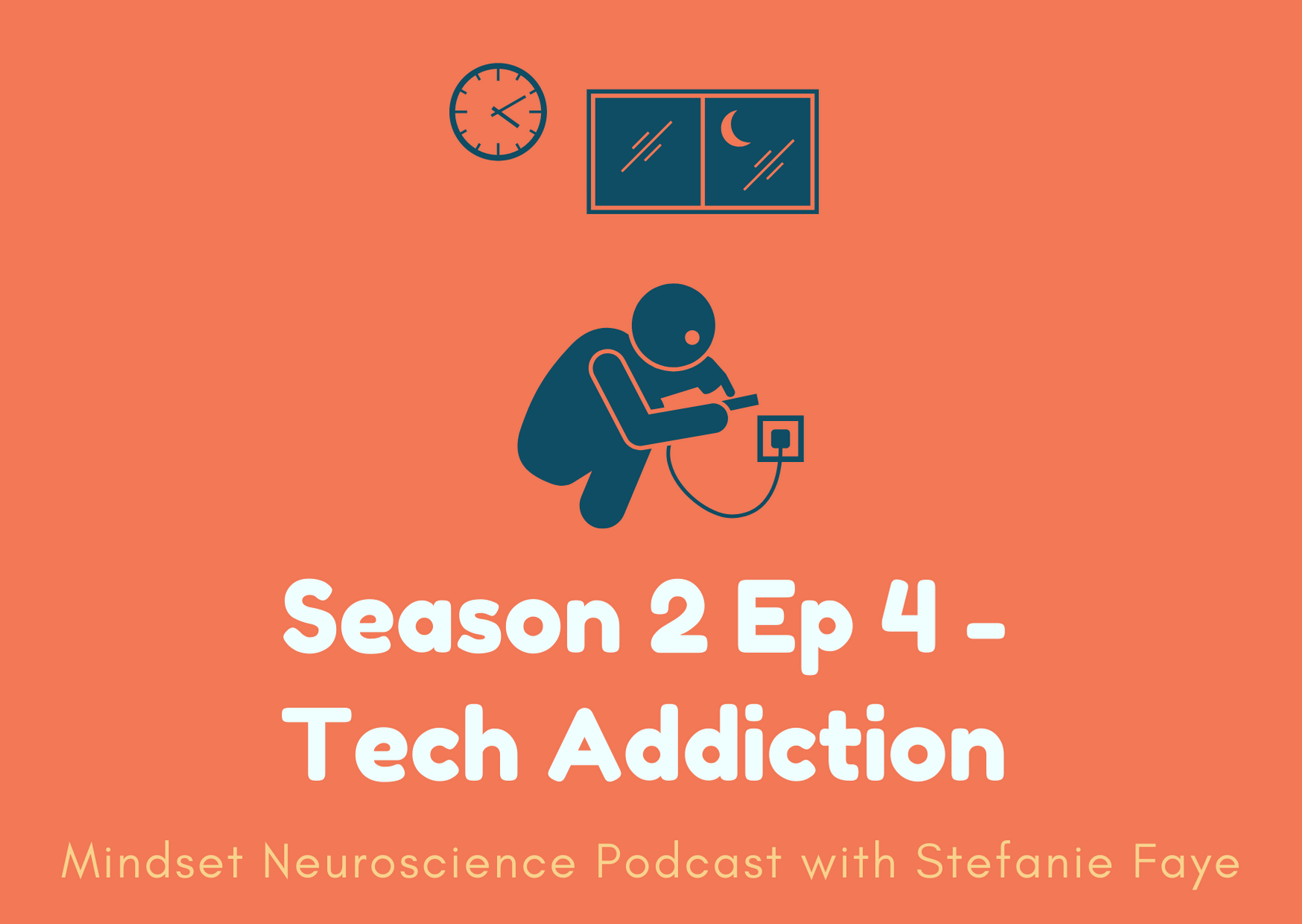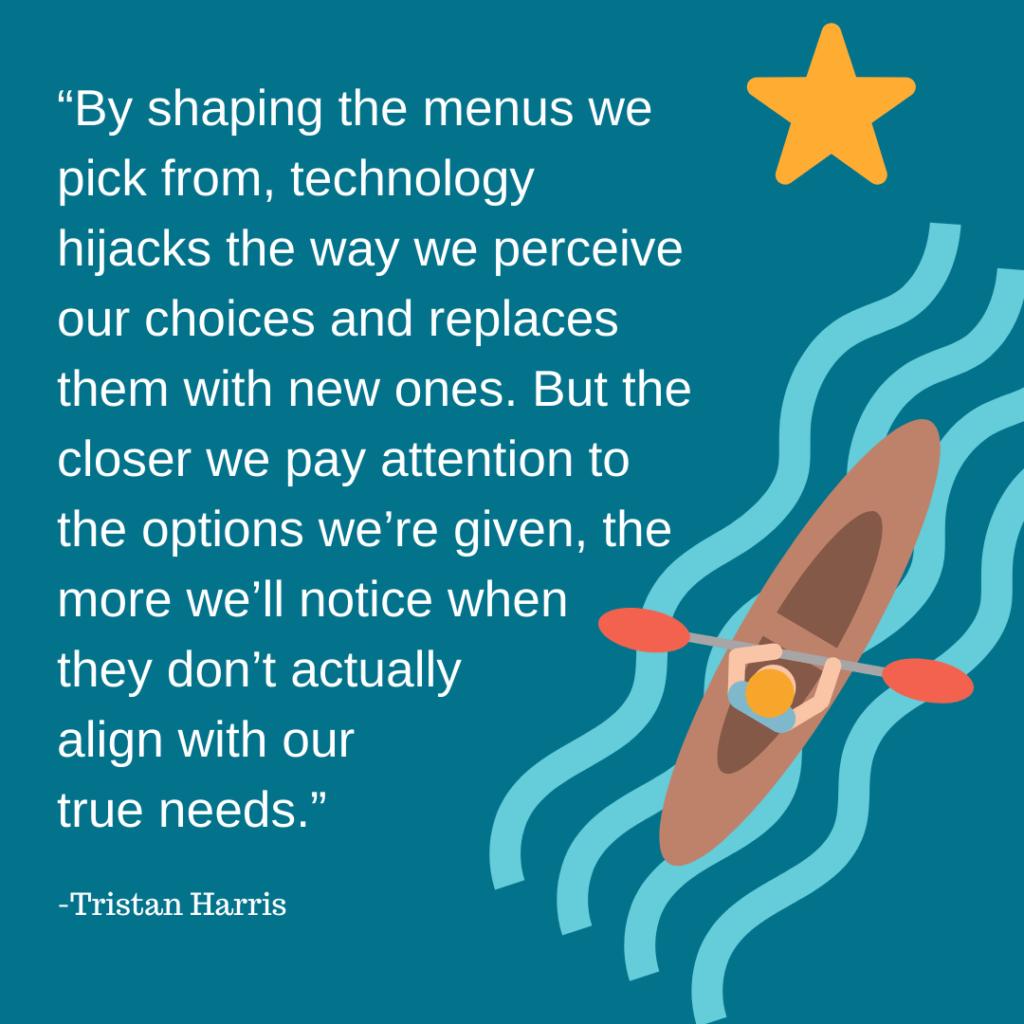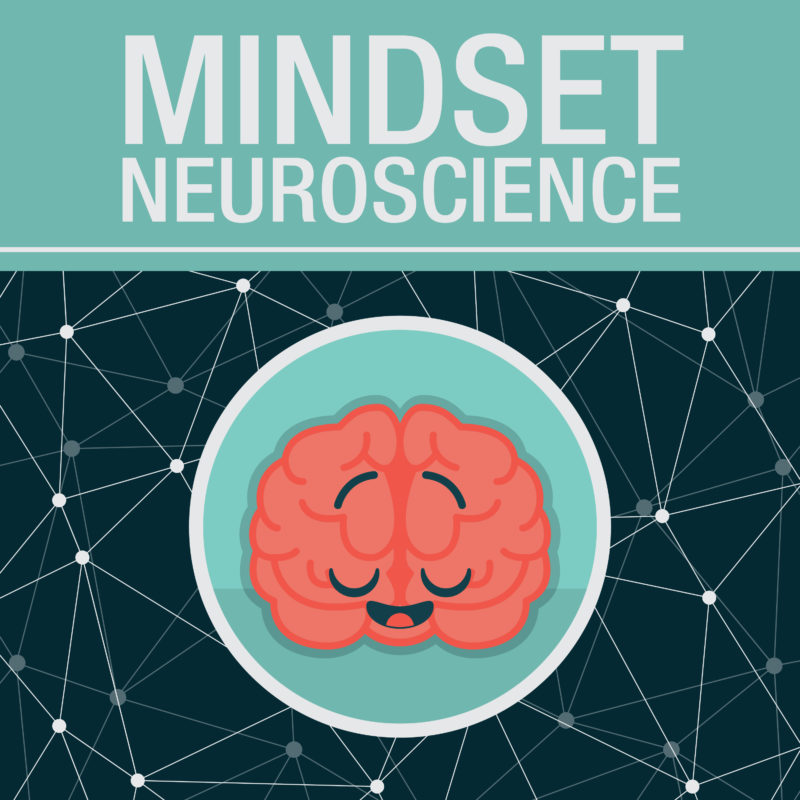
The human species has some pretty spectacular systems built into us to achieve mental, emotional and physiological states that most of us are not even really aware of.
We also have systems and features within us that make us very vulnerable to being influenced and 'programmed' into behavior that is not reflective of our most evolved neural circuitry.
Technology is interfering with and manipulating those systems.
And the more we get to know how technology is interfering with those systems, the more we can get control over our internal state rather than let the tech companies (who do not have the best interests of the human brain and nervous system in mind) hack into our vulnerabilities.
That is why organizations like Humane Tech - and documentaries like The Social Dilemna, are important for us to know about. We may not want to know how much we are being manipulated and used as a currency, but I think it's important for us to have some awareness of this.
So, technology is a big word. In the Social Dilemna, the main focus is on the free platforms, such as search engines and social media platforms like, Google, YouTube, Facebook, Instagram, Snapchat, Twitter and Tik Tok.
So, something to think about when we're using these free platforms is, what is the transaction?
We kind of take for granted that we get to just use these and love them. And I think a lot of us don't necessarily think about, what is the cost that we are paying?
Because we are paying one, even if it's not in dollars.
Part of the cost we are paying is a degradation of the human mind-brain-body system and many of its powerful features.
There are two particular aspects that the business model of the free platforms is amplifying to a degree that I think many of us don't fully understand how serious and detrimental this could be for us as a species.
These two key forces at play within our tech addiction are:
Inadequacy messaging (from marketing) and Patterns of instant gratification.
Inadequacy messaging - something that Jonah Sacks talks about in his book Story Wars, is the messaging that advertisers use to influence us into believing that that we are inadequate in our ability to succeed or get what we want with what we have - that there is something missing within our lives that needs to be filled by somebody else.
Patterns of instant gratification (my nickname for these are P.I.G.’s or “pigs”) are what we do to instantly feel better, regardless of whether that action will be good for us in the long term or not. P.I.G.’s are what keep us at a very immature level of our development of our neural circuitry - and are one of our vulnerabilities - that existed before technology, but that the algorithms and techniques being used by many technology companies are feeding off of and exacerbating to a degree that may have a serious impact on us a species.
There are few features that Inadequacy Messaging and Patterns of Instant Gratification have in common:
- It's about something outside of us. It’s something external, that is ‘not us’ that we want to use to make us ‘feel better’
- It is sparked by some desire to change our internal state. So sparked by some dissatisfaction or discomfort with our current physiological state that we want to change
- There’s some type of grasping of some type of object or ‘tool’ outside of us that we plan to use to create this change in our internal environment. There is some type of movement - often with an upper limb - to grab something we we will consume or use in some way that we think will make us feel better.
The biggest theme of both the patterns of instant gratification and the inadequacy messaging is the mindset or paradigm that: something that is ‘not us’, something outside of us - will make us feel better inside.
And this is what is being fed off of in terms of any type of addiction, or maladaptive repetitive behavior… it is the belief that we cannot feel better by using our own ‘self’, our own mind. We must have something outside of us to do that. So we can also call that ‘conditional self-regulation.
This can also relate to people - that we are constantly looking for other people’s approval and validation to ‘make us feel better’.
And this is the dysfunctional formula that social media is amplifying within us. And because of the sophistication of these algorithms, it is doing this to a point where we can become neurochemically altered into trance-like, repetitive behavior of how we decide to make ourselves ‘feel better’.
Repetitive behaviors are not necessarily good or bad, but when they become maladaptive, it means that we repeat our history, we stay stuck in patterns that we don't’ actually like, we stay stuck in patterns that keep us falling into the same situations over and over again that cause us anxiety or a feeling of being unfulfilled
And I think this type of maladaptive repetitive behavior is not what the human species is designed for.
If you look at other species (Max Tegmark and Eliezer Yudkowski both talk about this), we see that they are not going to expand into fundamentally new ways of problem solving. Bees are going to continuously make hives. They’re not going to expand what they have into making a different ‘product’. They will make hives, beavers will build dams, ants will build ant hills. But humans are able to rise above that. We have the capacity to flex and adapt with our environments to figure out how to become more flexible, more adaptable, more sophisticated, complex.
So nature has led us to be different than many of those species in terms of how much we can evolve and transcend our circumstances and innovate completely new situations in order to figure out how to adapt to our environment.
I believe that anything that keeps us repetitive in a maladaptive, automated, unconscious way is detrimental to us as a species.
When we are repetitive, we are not using those beautifully powerful features of the human mind-brain-body system.
And that is one of the main issues I see coming up about our use of technology and becoming hooked on social media - is there is a maladaptive, repetitiveness of our behaviors that I think is dangerous because it is preventing us from using that very evolved, sophisticated circuitry that we all have within us. It is part and parcel of the human brain.

In this episode, I go over some of what the Social Dilemna talks about in terms of the actual mechanisms and business model being used by free platforms and how this is being used in ways that is damaging human on a neurological level. I also go into some ideas about how we can gain our power back over our own patterns of instant gratification and maladaptive repetitive behaviors.
#humanetech #thesocialdilemna #techaddiction #tristanharris #selfregulation


Yes exactly, Leslie! It’s not an either/or good/bad situation… it’s how we use it. It has the capacity to unite or divide humanity, to enhance or degrade collective human intelligence 🙂
Stefanie, you just used social media to tell us we are less than what we could be and you will tell us how we can solve our problem. Ironic that this is exactly what you are saying is causing our degrading minds!!! Love it!
Yet it is true about so many addicted to computer communication instead of face to face communication, especially now with restricted physical contact with covid19 out of control. Zoom and email, texting, etc. are part of our adaption to stay connected and not lonely, and learn about the outside world as our own daily world shrinks. I have family across the globe and we are using social media to find each other and connect.
Also, 2 years ago I learned to knit solely watching Youtube tutorial videos. Then I joined a Facebook knitting group and got patterns online. Then l found from our local public library online newsletter, a knitting group that met 2x a month at our local library shared donated yarn and made hat and scarf sets for local charities, like the homeless and hats for chemo patients who lost their hair. And yarn stores sell online.
So technology was not all bad for fulfilling my bucket list item when I knew no one who would spend that much time with me to teach me to knit, like a grandmother would.
Yes, we are addicted to social media and Facebook feeds us only our side of issues which makes factions further apart and lacking each others useful knowledge and thoughts for better problem solving.
that just blew my mind… I was convinced there was an ‘n’ in that word! Amazing how our brains filter our perception based on what we already expect. Thanks for sharing that!
I absolutely love your podcast and am sharing it far and wide.
Heads up- dilemma is spelled with two ‘m’s. You are not alone in thinking otherwise, also of course language changes over time in these ways so maybe soon enough it will be spelled with an ‘n’, but thought you’d like to know. The small mistake is clearly no reflection of the extremely intelligent content of the podcast.
https://graspingforobjectivity.com/2014/09/the-dilemna-dilemma.html/